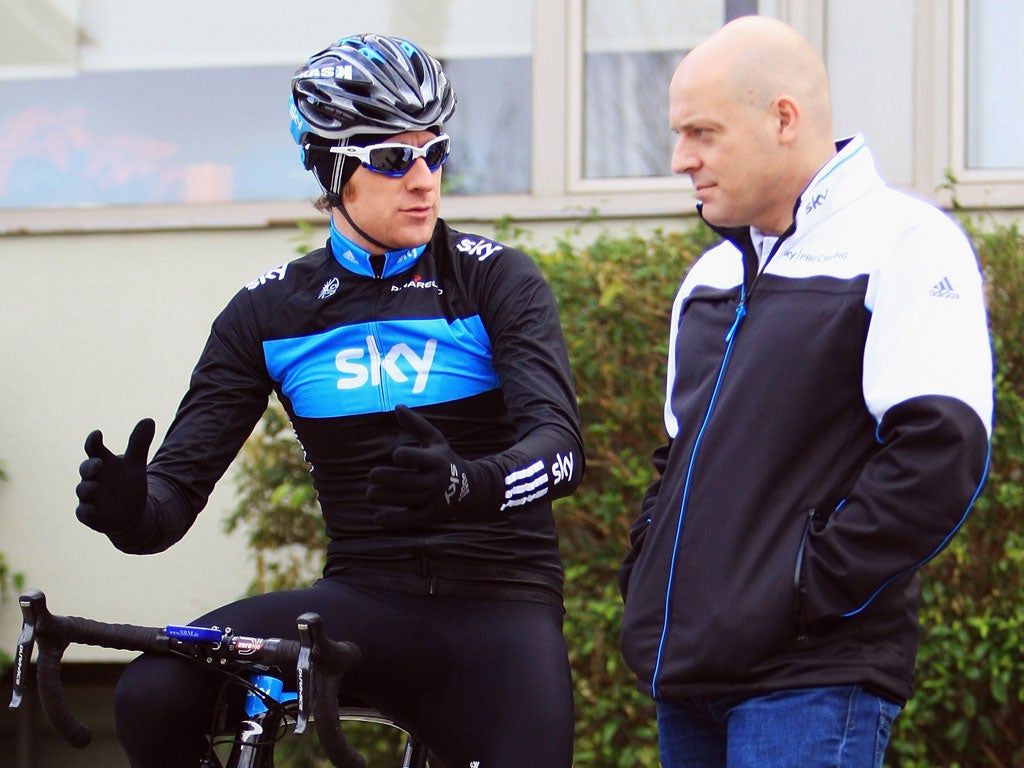Cycling: Dave Brailsford challenges the sceptics over Team Sky's clean riding
Armstrong scandal breeds suspicion but British chief defends drug-free record

The Team Sky principal Dave Brailsford has admitted that the credibility of his riders is tainted by Lance Armstrong, whose systematic doping operation has left the public "sceptical" about the British squad's sudden and dramatic success.
Though Brailsford set up Team Sky on a drugs-free platform, data on the Tour de France's top-10 finishers in the last 15 years shows that a third tested positive, admitted to doping or were sanctioned by an official cycling or anti-doping agency. Drugs were present every year until last summer's race, which Team Sky dominated, when for the first time no one registered positive.
The 2012 winner Bradley Wiggins launched an expletive-filled attack during the Tour on internet gossips who alleged that he took performance-enhancing drugs, though Brailsford has said that in the light of the Armstrong scandal suspicion is understandable.
"We set this team up as clean and our job is to make them go faster," he said. "But some of the tentacles of the past are impacting. So when people see the huge advances we are making, because of what happened in the past it is understandable that people are sceptical. What we want to work towards is a future where there is no doubt, so that when someone moves performance forward nobody questions it."
The aura which enabled Armstrong to draw others into his deceit was revealed yesterday when members of Brailsford's own team paid tribute to the American. "He is still a legend of the sport. A guy who had cancer came back and won the Tour de France," said Sky rider Alex Dowsett, who joined for the 2011 season from the US-based Trek-LiveStrong squad, an Under-23 development team created by Armstrong to nurture emerging talent. "It's not really important and I really don't think it matters what I think."
Wiggins' summer attack was on the "bone-idle" armchair critics for whom it is "easy… to sit under a pseudonym on Twitter and write that sort of shit, rather than get off their arses in their own lives and apply themselves and work hard at something".
Brailsford was likewise unhappy at such insinuations. The 48-year-old said during the Tour that at the end of the season he would invite the doubters to the National Cycling Centre in Manchester, where he would explain his methods. Asked if he still intended to do that he said: "Yeah, but we're not at the end of the season yet. There's this group out there, anonymous people who keep banging on, using pseudo-science.
"It's totally understandable why they have their opinions, and draw the conclusions they do, but I'd like to meet them and say, right, fire away, what do you want to talk about?"
There would, in fact, be nothing for those doubters to see at the Manchester Velodrome. It is the UK Anti-Doping agency which undertakes the testing. But cycling has introduced a "passport" style of testing, which collects all test results to establish a biological profile. In theory, this could be used either to catch sophisticated cheats who know how to evade the regular testing or to prove an athlete is clean.
Brailsford's mantra, like that of his predecessor Peter Keen, is that if all aspects of performance are right then there will be no need for the energy-sapping rigmarole tied up with the subterfuge of performance-enhancing drugs. But since 1996 many of the winners of the Tour de France have claimed the yellow jersey under a drugs cloud including Armstrong, Bjarne Riis (1996), the late Alberto Pantani (1998), Floyd Landis (2006) and Alberto Contador (2010). In all but three of the past 15 years, at least four of the top 10 finishers used drugs, with seven of the top eight the worst in 2003. Numbers have dropped since then, with only the winner, Contador, testing positive in 2010.
"I've been thinking about Armstrong a lot," Brailsford concluded. "In cycling we've got a past, a present and a future. Generation EPO is now the past. We can't deny it. The more you read about what went on, the more the jaw drops. But let's accept it happened.
"Now we have the present. It is understandable now for people to look at any results in cycling and question that. It completely and utterly lost its way and I think it lost its moral compass. Everybody has recalibrated and several teams like ourselves are hell-bent on doing it the right way and doing it clean."
Join our commenting forum
Join thought-provoking conversations, follow other Independent readers and see their replies
Comments
Bookmark popover
Removed from bookmarks